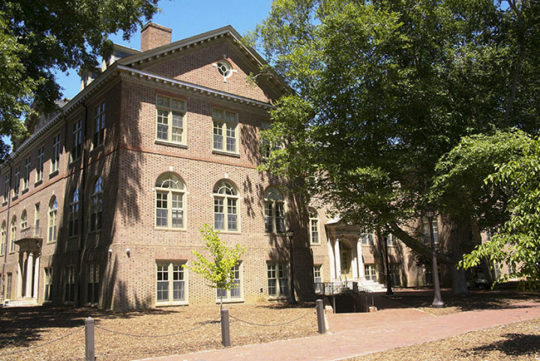Peninsula Indivisible hosted the second annual Stand Up Rally and Expo at Bruton High School in Williamsburg Sunday, Feb. 18. Nine speakers led a two-panel discussion on issues such as criminal justice reform, gerrymandering and racial justice while former political candidates provided insight. The activist expo featured 19 groups including OneVirginia2021, LGBT Life Center and Williamsburg-James City County Democrats.
Diann Smith, who helped organize the rally, said Peninsula Indivisible’s goal in overseeing the rally was to capitalize upon the fervor from the 2017 elections and use that to spur involvement for the upcoming elections this year.
We would like to see everyone in the area engaged with local groups, local advocacy groups, as well as local charities to get involved and to get started in the community and work to make their communities better,” Smith said.
“We would like to see everyone in the area engaged with local groups, local advocacy groups, as well as local charities to get involved and to get started in the community and work to make their communities better,” Smith said.
Newport News Mayor McKinley Price kicked off the rally with opening remarks, encouraging attendees to stay civically engaged.
“It is the constructive citizen input that brings to local government the perspective of the citizens and families that live and work here,” Price said.
95th District Virginia House of Representatives Delegate Marcia Price noted during the first panel speech that Virginia has made some progress in criminal justice reform but still has “far to go” due to the prevalence of the school-to-prison pipeline.
“As you all know, the school-to-prison pipeline is a thing,” Price said. “It is real. It is not a philosophical concept. Kids are being put in Virginia based on 2014 and 2015 numbers into the legal system and the court system for things that when you and I were young, we just went to the principal for.”
Black Lives Matter Hampton Roads founder Kimberly Tucker, who founded the chapter after she feared her son with a mental illness would be shot after an encounter with police, emphasized the need to do more for vulnerable individuals. She also agreed with Price regarding the prominence of the school-to-prison pipeline, noting that as a former assistant principal in a predominantly white district, she had to fight to keep students in school. Tucker said that some teachers would even attempt to target students so Tucker would have to expel them.
“I had a teacher who told a black student that he’d never amount to anything because his parents were either incarcerated or drug users,” Tucker said. “It is absolutely true that we target the most vulnerable students in our schools. And yes, when they are expelled, or suspended, they are not home doing their homework — they’re in the streets, with the older kids who are getting into trouble. And so what we are definitely doing is creating a pipeline from school to prison that we must combat by legislation that limits the number of days that a student can be suspended and that kind of thing.”
Price also called attention to the issue of mass incarceration in the American prison system.
“Our country incarcerates at alarming rates that Congressman Scott will tell you that there’s data that even says that we incarcerate at such a rate that it is counterproductive to reducing crime because of the families that are being disintegrated, because of the family structures, the morals and the income and just what happens to people when they come back from jail not being able to find housing, jobs, healthcare, and recidivism rate goes up,” Price said.
As she addressed the aftermath of the Majory Stoneman Douglas High School shooting in Parkland, Florida Feb. 14, Price said she had cried in frustration remembering the opposition she faced to gun legislation she and her colleagues had proposed just two weeks earlier.
“When I get emails asking me, ‘Well what are you doing about gun violence?’ it’s a little insulting,” Price said. “Because we are trying. And in the House of Delegates, you need 140 people to vote on something that seven people can say ‘It’s never getting to the floor for a full vote.’ My bills died on a 5-2 party line vote and never got heard by the full floor. Most of you will never know how your delegate would have voted for it, because it just didn’t get there.”
OneVirginia2021 Executive Director Brian Cannon ’04 J.D. ’11 spoke on the problems facing representative democracy in Virginia and emphasized the issue of gerrymandering, which his organization is trying to reform. Cannon said he had heard people claim that Virginia’s recent “blue wave” was proof that gerrymandering does not work. He explained that was not the case. While Democrats in the House of Delegates were plus nine and received 49 percent of the seats, two years ago Republicans were also plus nine but received 66 percent of the seats.
Not only is gerrymandering powerful, but it was powerful enough to withstand a nine-point democratic wave, which, I think as fans of democracy and fans of government, if any team has a nine-point wave, they should be the ones with the gavel,” Cannon said.
“Not only is gerrymandering powerful, but it was powerful enough to withstand a nine-point democratic wave, which, I think as fans of democracy and fans of government, if any team has a nine-point wave, they should be the ones with the gavel,” Cannon said.
Cannon said he believes that the issue of gerrymandering demonstrates that America has a problem with how its representative democracy system functions.
“The fact of doing nothing is not acceptable,” Cannon said. “And when 70 percent of Virginians or 70 percent of Americans want something to happen and your government doesn’t respond, you’re missing the representative part of a representative democracy. … There’s all these things that are pulling us artificially apart and letting our government not really reflect who we are.”

